

Venturing Abroad, The American Dream
Setting out on an academic quest to a foreign land is an enthralling adventure, brimming with unique opportunities, cultural exchanges, and a chance for sig-nificant personal and career development. The USA, with its world-renowned universities, diverse landscapes from coast to coast, and a storied history of innovation and freedom, has long stood as a beacon for students from all corners of the globe.
But every journey that looks beyond one's borders requires careful preparation and a deep understanding of the rules that govern such transitions. Foremost among these is securing the necessary student visa.
Each country's visa regimen is a reflection of its ethos, its concerns, and its aspirations.
The visa application process for the US is intricate and holds immense signifi-cance. Minor lapses, overlooked documentation, or even a vague declaration of intent can cause unforeseen complications. These might result in delayed re-sponses, jeopardizing timely enrolment, or in some cases, outright denials, prompting students to reconsider their global academic dreams. This narration isn't to instil fear, but to emphasize the gravity of thorough groundwork. By delving deep into the specifics of the US visa guidelines, stu-dents equip themselves to traverse this path with confidence and clarity.
In this blog, we'll take you through the following topics on Student Visa for USA:
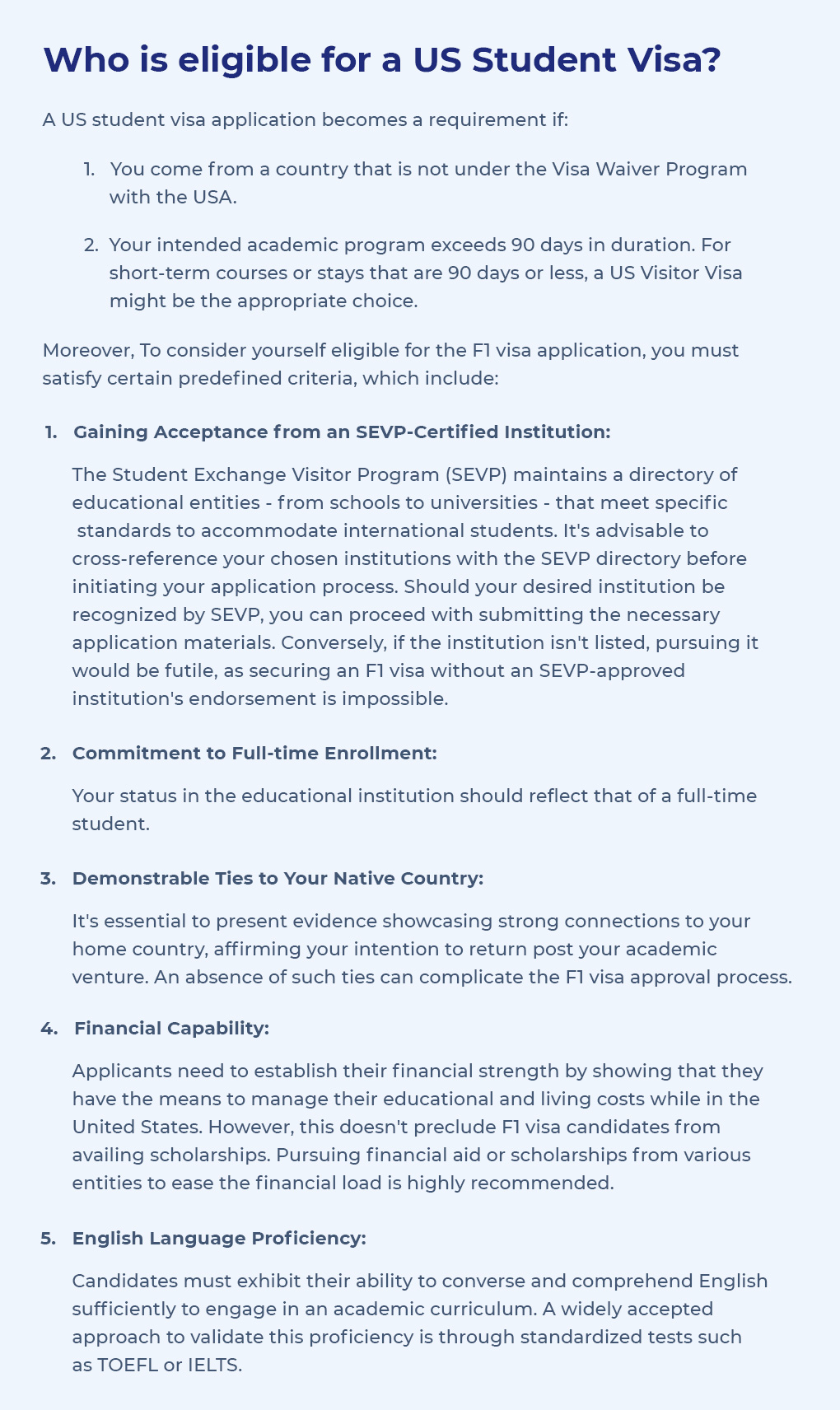
Recognizing the myriad educational desires of global students, the USA has segmented its student visas into specific categories. Grasping these categories, their objectives, and intricacies is pivotal for a smooth transition into the American educational system.
F-1 Visa: For Academic Studies A beacon for those aiming for an in-depth ac-ademic experience in the USA, the F-1 Visa is tailored for students attending an academic program or English Language Program.
J-1 Visa: For Exchange Visitors Designed for students, scholars, or profes-sionals participating in a variety of exchange programs, the J-1 Visa serves a wide range of academic and cultural pursuits.
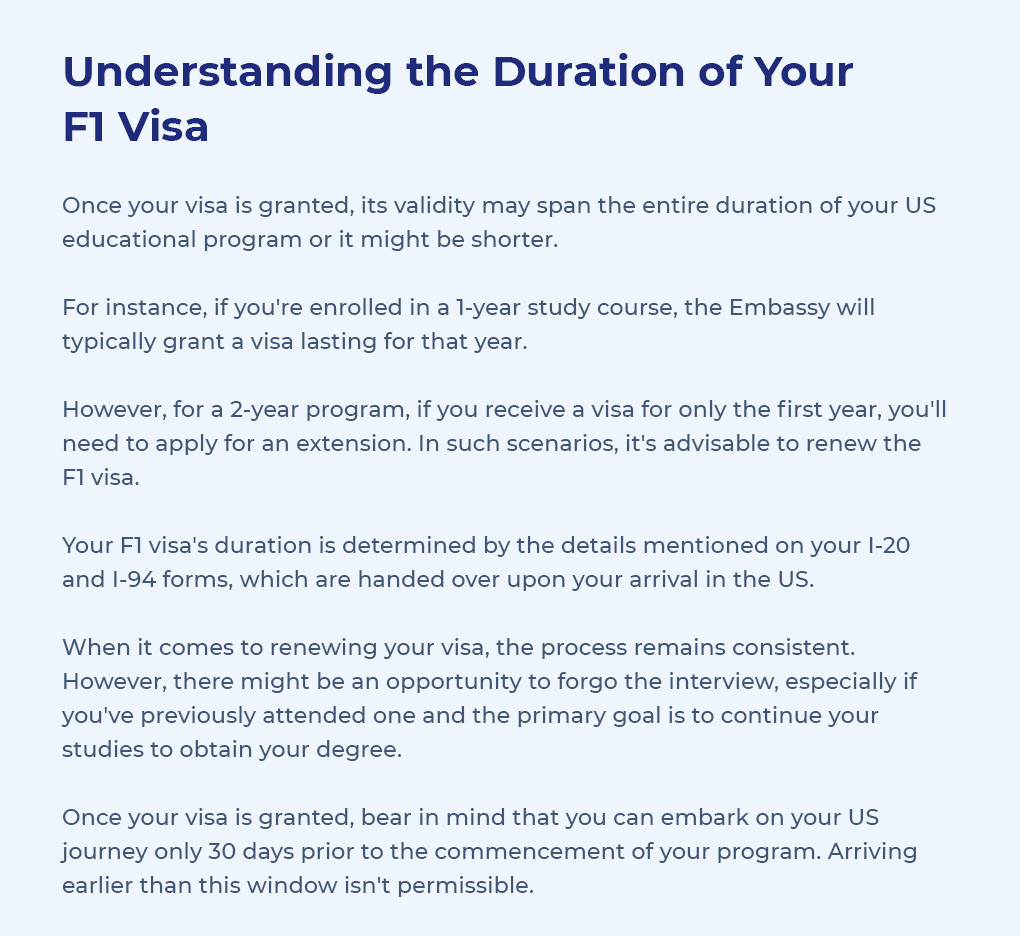
M-1 Visa: For Vocational or Non-Academic Programs The M-1 Visa is the pathway for international students intending to pursue non-academic or voca-tional studies in the USA.
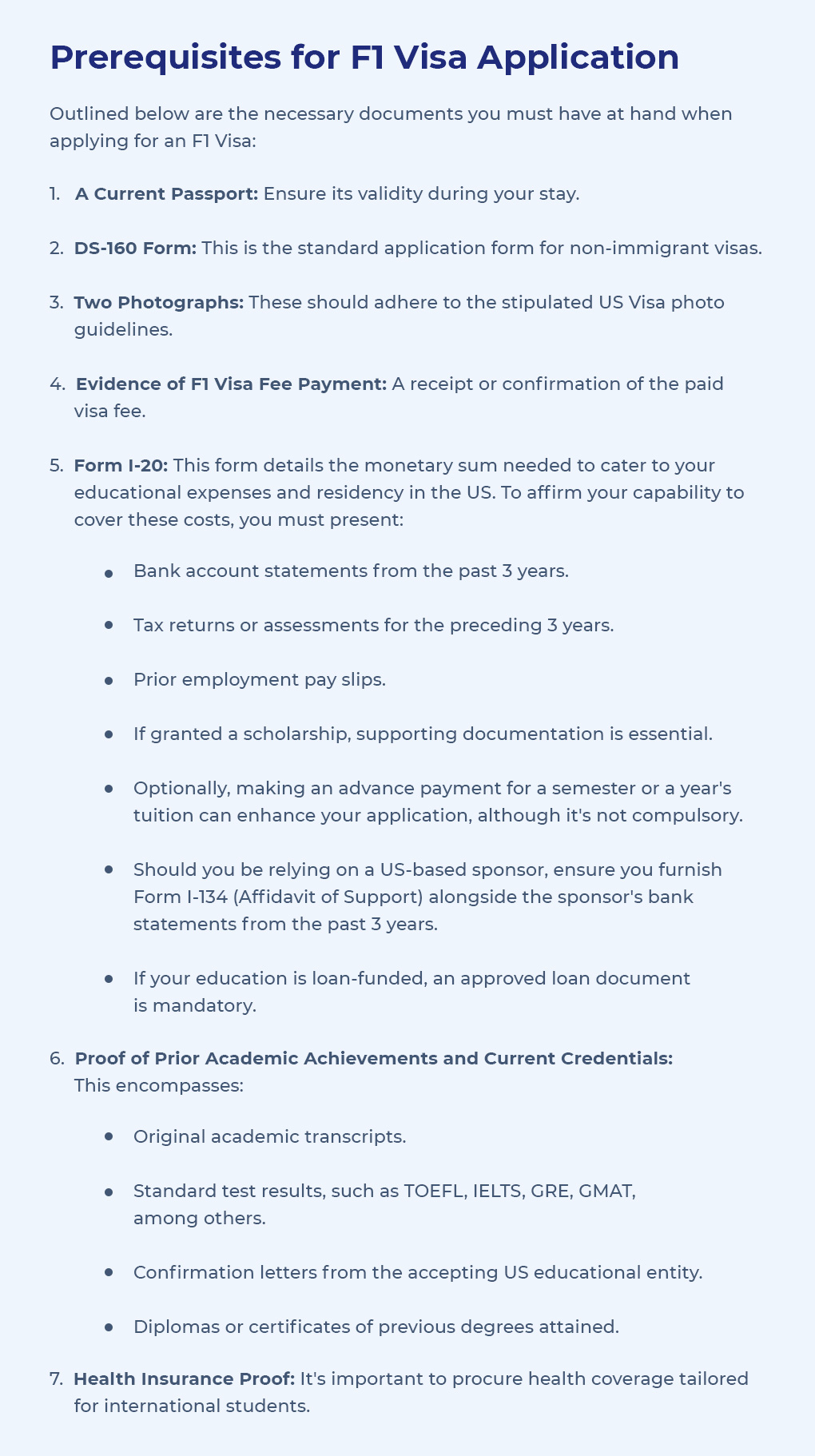
The dream of pursuing higher education in the acclaimed academic institutions of the United States resonates with many international students worldwide. To actualize this dream, it's imperative to adeptly navigate the maze of visa docu-mentation required for the U.S.
Each document stands as evidence of a student's intent, dedication, and pre-paredness to join the academic circuit of the U.S.
Let's dissect these vital prerequisites and fathom their significance in the U.S. student visa application journey:
A formal I-20 form, issued by your chosen U.S. institution, is paramount for your visa application. This form confirms your acceptance into a specific pro-gram, specifying key details such as the course's duration, fees, and structure.
The SEVIS I-901 fee, associated with the Student and Exchange Visitor Infor-mation System, needs to be paid before your visa application. This payment serves as a testament to your genuine intent to study in the U.S. Remember, different visa categories might have different fee structures.
While the U.S. does not mandate health insurance for visa approval, many universities and institutions require international students to have health cov-erage. It's a protective measure, ensuring that students are medically secured without the strains of hefty medical expenses.
Showcasing your ability to bear tuition and living expenses is vital. By provid-ing proof of financial stability, students assure U.S. authorities of their capa-bility to sustain themselves throughout their academic stint without burdening public resources.
For most universities, demonstrating funds to cover the first year of expenses, including tuition, living, and other miscellaneous costs, is essential.
The cornerstone of international mobility, a valid passport is essential. It solid-ifies your legality of stay and functions as your chief identification. Passport-sized photos, adhering to U.S. norms, are pivotal for various official protocols and records during your tenure.
This document offers a glimpse into your academic and personal motivations. It's not merely procedural—it's a narrative. A compelling statement not only details your objectives but also elucidates your reasons for selecting a particu-lar U.S. institution and program.
Your prior academic documents, encompassing transcripts, diplomas, and other certificates, map out your educational trajectory. They reinforce your stated qualifications and establish your preparedness for your chosen U.S. ac-ademic program.
For applicants from non-English-speaking countries, proficiency in English is crucial. Standardized tests like TOEFL, IELTS, or PTE affirm that students have the linguistic competence required for active participation in a primarily English-taught academic environment in the U.S.
Procuring a U.S. student visa demands a precise and organized application process. The procedure, with its mix of online and manual components, veri-fies a student's sincere intent, dedication, and aptitude for American academic pursuits. In this guide, we unravel each phase, providing clarity and knowledge to facilitate your journey to the United States.
When should you commence the student visa application process for study-ing in the U.S.? Beginning your U.S. student visa application early is prudent, especially considering that the typical processing time can vary depending on several factors. As a guideline, you can apply up to 120 days before the start date of your course, as mentioned on your Form I-20.
Online Application: Streamlining through the DS-160 FormThe DS-160, Online Nonimmigrant Visa Application form, represents the U.S. govern-ment's approach to digitizing and harmonizing visa application methods. This user-friendly online form gathers critical data about the applicant, giving the authorities a comprehensive overview of your academic and personal back-ground.
It captures extensive information regarding your personal details, academic records, and intended academic path in the U.S. Being online, it offers efficien-cy, minimizes manual discrepancies, and expedites the visa processing time-line.
Documentation: The Pillar of Your Application Documentation stands cen-tral to the visa application procedure. Each transcript, certificate, and letter coalesce to depict your academic trajectory, financial stability, and earnest in-tent to study in the U.S.
Each document bears its distinct value, from validating your educational back-ground to corroborating your financial means. Without the proper set of doc-uments, your application might lack authenticity, possibly resulting in defer-rals or denials.
Application Fee: A Step Towards Your Dream
International applicants should be aware that there's a standard visa applica-tion fee of US$160 (do check the latest fee when applying here)
Additionally, F and M visa applicants are subject to a US$350 SEVIS fee, while most J Visa applicants incur a fee of US$220. These fees cater to the SEVIS system, a digital platform that monitors your residency duration in the United States.
Biometric Information: Enhancing Security Measures In today's era of tech-nological evolution and amplified security precautions, biometric details have become central to visa processes. This phase entails capturing your finger-prints and a digital photograph.
The dual objective here is to amplify the security protocols ensuring the appli-cant is genuinely the claimed individual and avert potential identity deceptions. This biometric data aids U.S. officials in promptly authenticating an appli-cant's identity at various stages.
Interview: An Insightful Exploration of Your Intent Almost every U.S. stu-dent visa applicant must attend a visa interview. This engagement allows con-sular officers to delve into the nuances of your application, addressing any po-tential gray areas. For applicants, it's an occasion to further elucidate motiva-tions and seek clarifications. View the interview as a collaborative discussion, ensuring alignment between the consular officers and the applicant.
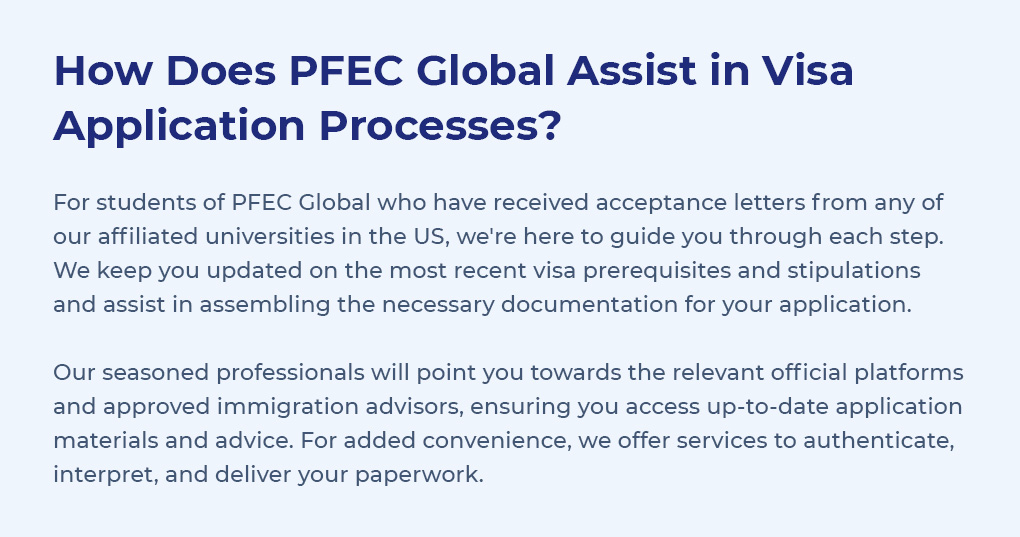
After the Visa Approval: Beginning Your American Journey Right Once your U.S. student visa is greenlit, it’s indeed a cause for jubilation!
However, this isn't the final destination. Post-approval, there are vital steps you must take to ensure continued compliance with U.S. government regula-tions throughout your academic journey in America.
Understanding and abiding by these measures can significantly streamline your academic experience, helping you avert unexpected setbacks.
Registration with SEVIS: A Mandatory Initial Step Upon your arrival in the U.S., one of the primary tasks is to register with the Student and Exchange Visitor Information System (SEVIS). This isn't merely bureaucratic red tape—it’s an integral step confirming your presence and intent to the U.S. govern-ment.
Your designated school official (DSO) will guide you through this process, and you're typically required to report to your educational institution. The SEVIS registration updates your status and activates your record, ensuring you’re recognized as an active student.
Staying Compliant: Upholding the Integrity of Your Visa Your U.S. student visa isn’t merely a stamp—it’s an understanding between you and the U.S. government, laden with responsibilities and expectations.
A primary duty is to ensure you don't exceed your visa's timeframe. While ac-ademic rigors and extracurricular activities may dominate your schedule, it's crucial to keep a tab on visa deadlines. Utilizing electronic reminders or mark-ing vital dates on your planner can be invaluable.
Moreover, it's crucial to refrain from contravening any visa conditions, like unauthorized employment or failing to maintain a full course load. The U.S. government is stringent regarding these violations.
Non-adherence could lead to severe consequences, ranging from monetary pen-alties, deportation, or even future entry bans into the U.S. Such discrepancies might also jeopardize subsequent visa applications, not just for the U.S., but potentially for other nations.
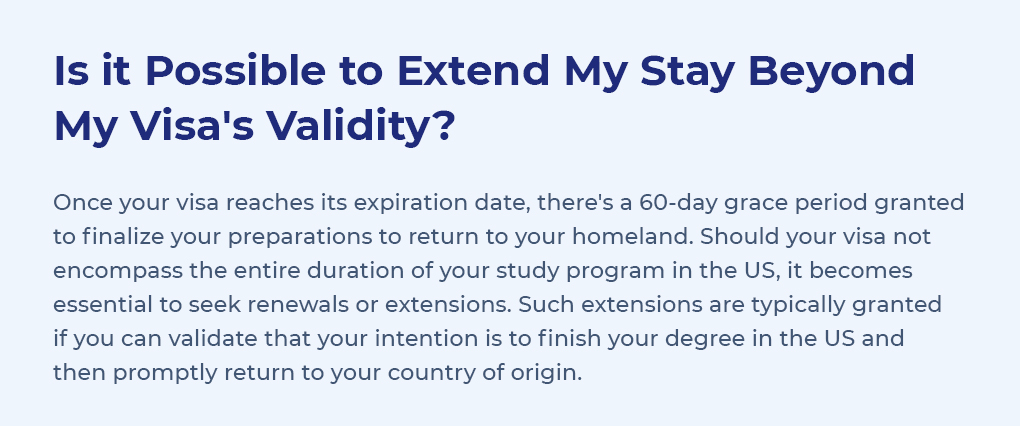
With an F-1 visa, students do have certain employment opportunities. Howev-er, there are stringent guidelines:
Securing a student visa for the USA is a monumental step in your academic pursuit. Though the path is well-charted for the well-informed, certain mis-steps can introduce unnecessary stress, setbacks, or even outright denials. Be-ing cognizant of and evading these prevalent blunders can delineate the line be-tween an untroubled passage into the U.S. and unforeseen impediments.
With the elation of acceptance into an American academic institution, some students mistakenly relegate the visa application to the sidelines, presuming it’s a mere formality. But visa processing can sometimes be a wildcard, often extended due to reasons ranging from high application influx to unexpected bureaucratic delays.
Postponing the visa application could corner you into a situation where, de-spite having an admission offer, you're left without a visa to initiate your stud-ies. The fallout of such an oversight could span missed classes, intricate re-scheduling, or, in dire circumstances, relinquishing your reserved academic seat.
Pro Tip: Prudence dictates padding your visa application timeline. Refer to the U.S. embassy or consulate’s website for typical processing durations and strategize to submit your application considerably beforehand.
The visa application paperwork offers the U.S. government an insight into your credentials, objectives, and readiness for American academia. Omissions in this critical paperwork can not only decelerate the process but also might instigate instant rejections.
Ensure you consult the official requisites and draft a meticulous list of all nec-essary documents. Before dispatching, rigorously vet your application or con-template soliciting feedback from a trusted advisor or academic guide to ensure all is in order.
Pro Tip: Maintaining a digital archive of every document is a wise move. This ensures that you have ready access if you need further copies or encounter un-foreseen challenges.
Central to your visa application is the attestation of your financial robustness, confirming to U.S. officials your capacity to manage your stay during your ac-ademic tenure. Ambiguous or erratic financial records can incite skepticism, prompting authorities to question the sincerity of your student status.
It's paramount to furnish transparent, steady, and authenticable evidence of your financial health. Sudden large deposits, unclarified transactions, or an in-sufficiency of funds might be perceived as warning signs. It’s essential that your financial documents lucidly showcase your capability to shoulder tuition, lodging, and living costs.
Pro Tip: Should your financial documentation display notable movements or alterations, it's advisable to append an elucidative note or corroborative pa-perwork to stave off potential queries or apprehensions.
While the application for a U.S. student visa is fundamentally systematic, the crux is in the specifics. Mastery over preparation is pivotal, but equally significant is traversing the process with attentiveness and sincerity. Delve into these strategic insights that can amplify the likelihood of your application's green light, propelling your ambitions of academic pursuits in the USA closer to realization.
The domain of U.S. immigration and visas is in perpetual flux. Regulations, prerequisites, and protocols can metamorphose owing to a plethora of reasons, from international dynamics to internal administrative overhauls. Consequently, grounding decisions on antiquated data or second-hand accounts might inadvertently derail your application.
It's astute to harness information straight from the horse's mouth — U.S. immigration official sites or accredited visa consultancy entities. Educational advisors at your target institution might also proffer wisdom gleaned from prior students' journeys.
Pro Tip: Persistently monitoring the official U.S. visa and immigration website, even post-initiation of your application, safeguards against being blindsided by abrupt modifications impacting your trajectory.
The uprightness of your U.S. visa application holds supreme importance. Peddling fabricated or tampered documents is a cardinal misstep with far-reaching consequences. Such a violation can instigate an instant denial of your application, tarnishing your profile for prospective visa pursuits or global academic endeavours.
Unwavering commitment to the veracity of every document, be it academic records or financial affirmations, is obligatory.
Pro Tip: In the face of a missing document or a detectable discrepancy therein, it's judicious to attach an explanatory commentary or certified clarification as opposed to embracing questionable workarounds.
Maintain Open Communication: Candor Reigns Supreme Subsequent to dispatching your visa application, you might confront scenarios demanding a pivot — like cherry-picking an alternate program, migrating to a different college, or postponing your enrollment. It's of paramount importance to swiftly relay such shifts to the U.S. visa officials.
Active disclosure not only fosters confidence but also guarantees that your visa aligns with its delineated purpose. Being anticipatory in these instances trumps a belated scramble, which can germinate future snags.
Pro Tip:Maintain a meticulous log of all interactions with visa personnel. Archiving correspondences, be it electronic mails or official communiqués, proves invaluable in the event of disparities or misinterpretations.
In the realm of global education, the USA is a beacon, not merely for its pres-tigious institutions but also for its dynamic fusion of diverse cultures, ground-breaking advancements, and boundless opportunities. While every lecture brings academic enlightenment, a broader, life-altering experience lurks in eve-ry campus corner.
However, the gateway to this transformative journey is a decisive step: obtain-ing your U.S. student visa.
American universities and colleges, steeped in a tradition of scholarship and pioneering, have been instrumental in moulding luminaries, visionaries, and changemakers.
The dedication to academic rigor, paired with a formidable infrastructure for international students, guarantees a comprehensive educational sojourn.
From sprawling state-of-the-art campuses to time-honoured academic edifices, the USA showcases a variety of atmospheres wherein students can not only excel scholastically but also evolve on a personal level.
Yet, the USA's magnetism extends beyond its classrooms. As a melting pot of cultures, traditions, and innovations, it invites students to delve into its vast mosaic of experiences.
Whether it's witnessing the dazzle of Broadway, hiking the vast national parks, attending a lively cultural festival, or experiencing the fast-paced life of me-tropolises like New York and Los Angeles, the USA offers moments that linger in memory long after the academic chapter concludes.
Furthermore, the congeniality and inclusiveness of Americans accentuate the nation's allure, fostering a sense of belonging and community among interna-tional students.
Against this backdrop, the student visa transforms from a mere procedural requisite to the golden ticket for this wide-ranging journey. Mastering the nu-ances of the visa application cycle ensures that aspirants sidestep potential snags, aligning them with their vision of pursuing education in the USA.
While the student visa is a palpable mandate, its underlying essence is monu-mental. It symbolizes the commencement of a voyage promising scholastic strides coupled with profound personal revelations.
So, as you set sail towards the Land of Opportunity, bear in mind that the dili-gence dedicated to deciphering and manoeuvring the visa terrain isn't solely about adherence; it's about ensuring an uninterrupted, pristine panorama of experiences awaiting you in the USA. The promise of America beckons, and with a meticulous approach to your visa application, its abundant offerings are just around the corner.

Studying abroad is an exciting and life-changing experience that offers students a chance to gain a global perspective and valuable exposure ...

In our rapidly globalizing world, where boundaries are melting away and opportunities abound, proficiency in the English language has become ...

Choosing to pursue higher education abroad is an exciting and life-changing decision. Among the plethora of options available to internationa...

Studying abroad is a life-altering adventure that opens doors to new cultures, experiences, and opportunities. Among the plethora of global s...

Australia, renowned for its world-class education and diverse cultural experiences, continues to be a favoured destination for international ...

Australia is not just famous for its iconic Sydney Opera House, the Great Barrier Reef, and its unique wildlife; it is also recognized global...

Studying abroad is a life-changing decision, and with so many options available, it can be overwhelming to choose the right country and univers...

As of March 2022, Australia has seen a consistent rise in its international student numbers, with enrolments reaching 440,219. This marks an ...